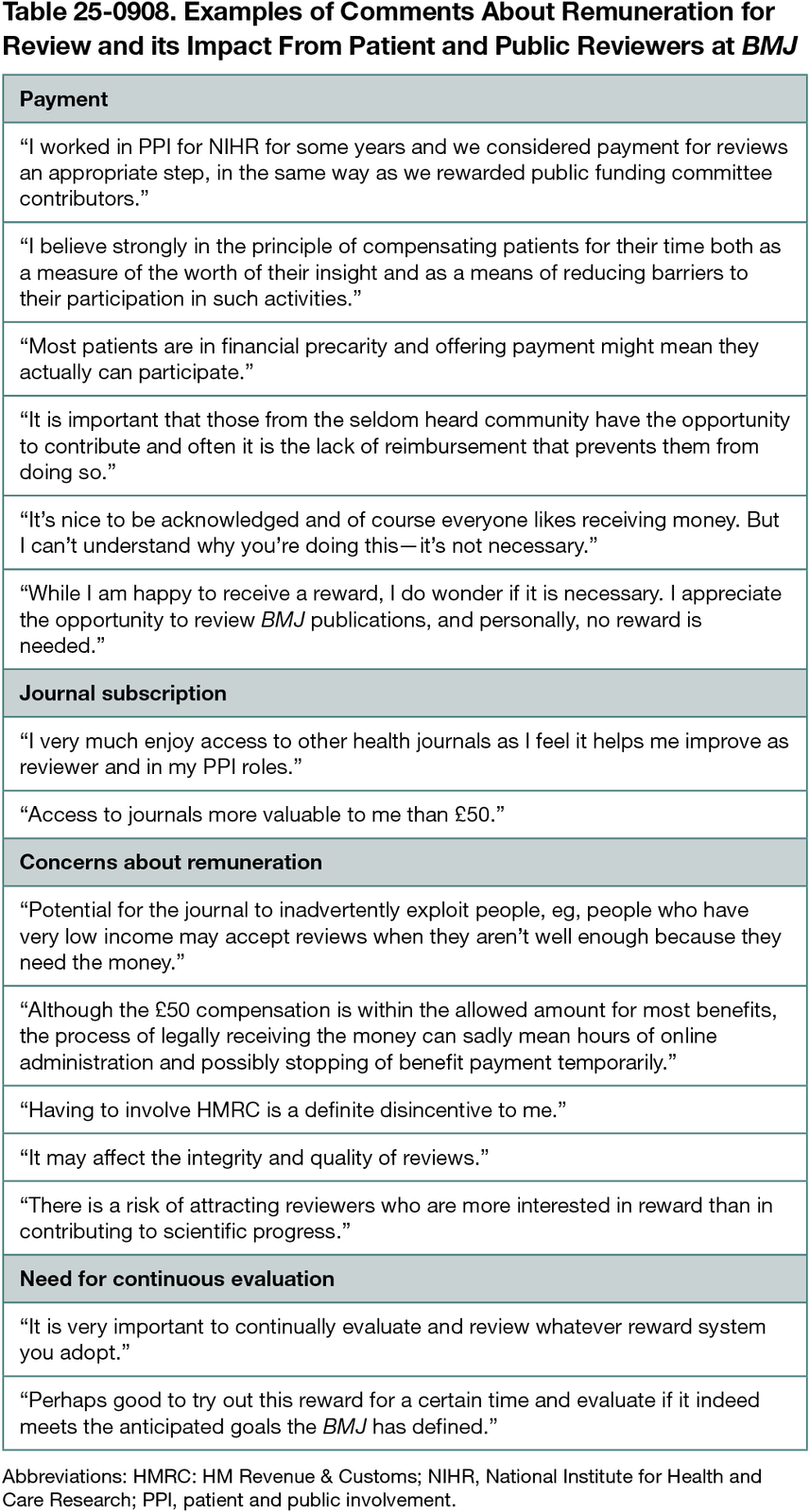Exploring Views on Remuneration for Review:
A Survey of BMJ’s Patient and Public Reviewers
Abstract
Sara Schroter,1,2 Rebecca Harmston,3 Emma Doble,1 Sophie Cook,1 Amy Price4,5
Objective
Calls for patient partners to be paid for their contributions to the health sector are growing.1 The BMJ invites patients and the public, as well as academic and clinical peer reviewers, to review manuscripts.2 On November 28, 2024, BMJ announced it would remunerate its patient and public reviewers from 2025.3 We surveyed these reviewers to capture their perspectives on the introduction of remuneration and overall experience of reviewing.
Design
Survey of current patient and public reviewers (those who had completed a review in the previous 3 years) on SurveyMonkey on December 11, 2024. We asked reviewers about their experiences of reviewing and their perspectives on the introduction of remuneration (£50 or an online subscription to a BMJ journal was provided for each completed review).
Results
We received a response from 183 of 267 invited reviewers (69%). Independent t tests showed that respondents, compared with nonresponders, received more invitations (mean: 14.0 vs 10.3; P = .01) and completed more reviews (mean: 7.7 vs 3.7; P < .001), but there was no difference in 5-point review quality score (mean: 3.8 vs 3.8; P = .81). The majority of respondents were based in the UK and the US. Respondents were positive about their experience of reviewing: 84% (n = 154) reported it as a very good or good experience. The primary motivation for 93% of reviewers (n = 170) was contributing patient perspectives to the research process. Regarding remuneration, 87 (48%) and 58 (32%) indicated they would be more likely to review a manuscript if they were offered £50 or a 12-month online subscription to one of our journals, respectively. However, approximately one-third said these incentives would not make them more likely to review (60 [33%] payment; 71 [39%] journal subscription), and 30 (16%) and 48 (26%), respectively, were unsure. Half of the participants (n = 93 [51%]) thought offering the choice of these incentives would help attract a more diverse sample of reviewers, 69 (38%) were unsure, and 15 (8%) did not. Views on remuneration were divergent (Table 25-0908) with some seeing it as a recognition of value and others considering it unnecessary. While 107 (58%) had no concerns about introducing payment for patient and public reviewers, 37 (20%) did have concerns and 33 (18%) were unsure. Concerns included potential conflicts of interest, tax implications and effort of declaring, impact on means-tested benefits, effect on review quality and integrity, people becoming reviewers for the wrong reasons, and high foreign exchange banking fees. Others viewed the remuneration as a modest token unlikely to influence quality. Respondents emphasized the importance of optional incentives to accommodate individual preferences and suggested monitoring the quality of impact after implementation of remuneration.

Conclusions
BMJ’s patient and public reviewers hold diverse views on reviewer remuneration, highlighting the importance of providing flexible, optional incentive choices to accommodate varying individual needs, values, and preferences.
References
1. Asante K. Remuneration of African patient partners is an important tool for health justice. BMJ. 2024;387:q2675. doi:10.1136/bmj.q2675
2. Schroter S, Price A, Flemyng E, et al. Perspectives on involvement in the peer-review process: surveys of patient and public reviewers at two journals. BMJ Open. 2018;8(9):e023357. doi:10.1136/bmjopen-2018-023357
3. Doble E, Schroter S, Price A, et al. The BMJ will remunerate patient and public reviewers. BMJ. 2024;387:q2581. doi:10.1136/bmj.q2581
1BMJ, BMA House, Tavistock Square, London, UK, sschroter @bmj.com; 2Faculty of Public Health and Policy, London School of Hygiene and Tropical Medicine, London, UK; 3Patient and public reviewer, BMJ, London, UK; 4Dartmouth Health, NH, US; 5Colorado School of Public Health, CO, US.
Conflict of Interest Disclosures
Sara Schroter and Sophie Cook are employed by BMJ, Emma Doble is a freelance patient editor for BMJ, Amy Price was a freelance patient editor for BMJ, and Rebecca Harmston is a patient and public reviewer for BMJ.
Acknowledgment
We thank Layla Abdulbaki, Shahad Al Mashjari, Shahd Rihawi, Alaa Almuhaini, Hygieia Jacob, Munya Alshaalani, Aliaa Bhahzad, Manvi Upadhaya, Zainab Almutawa, Sarah Khan, Adriana Goracci, and Adrian Yee for piloting the questionnaire, providing feedback on the clarity of the questions, and reviewing the work for readability and relevance. We appreciate all of BMJ’s patient and public reviewers who participated in the study.
